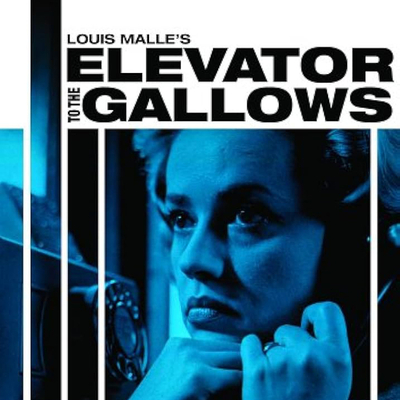The French invented the term film noir – it's supposed to have been coined in 1946 by the critic Nino Frank – but it took them years to come up with their own contributions to the genre, by which time it was very nearly played out in Hollywood. That American film noir was essential to the earliest films by most directors of the French New Wave is generally accepted; that something critical was lost in translation is just as certain.
Louis Malle had a strange relationship with his peers in the nouvelle vague; like the very different Eric Rohmer, he never settled easily amidst directors like Godard, Truffaut, Chabrol and Rivette. After a handful of pictures (The Lovers, Zazie in the Metro, The Fire Within) that would fit nicely into a rep cinema New Wave retrospective, he began wandering away, and by the second half of his career he was in America, making films in English (Pretty Baby, Atlantic City, My Dinner with Andre, Crackers, Alamo Bay) and married to Candice Bergen, a movie star.
After a brief return to France for two films (Au revoir les enfants and Milou en mai) he ended his career with a romantic thriller (Damage) and Vanya on 42nd Street, which like My Dinner with Andre is probably one of the most perfect examples of a film festival film. He died in Beverly Hills in 1995, a long way from his start working as Jacques Cousteau's cameraman and his first film, a dreamlike crime thriller where all those American influences are turned into something unmistakably French, like the Croque McDo or P'tit Fondu you'd buy in a McDonald's in Paris.
Elevator to the Gallows (in French Ascenseur pour l'échafaud) begins with a closeup of Florence (Jeanne Moreau) declaring her love for Julien (Maurice Ronet). As the camera pulls back over the credits while Miles Davis' famous soundtrack sets the mood, we discover that they are on the phone with each other; at no point over the next ninety minutes will they ever share a scene together.
Like the adulterous lovers in a James M. Cain story like The Postman Always Rings Twice or Double Indemnity, they have hatched a plot to kill Carala (Jean Wall) – Florence's husband and Julien's employer – and make it look like suicide, before escaping to new lives together. Julien is an ex-paratroop and hero of the wars in Indochina and Algeria, by reputation a very capable man, and as in every murder his plan goes well until it goes wrong.
After accidentally leaving the climbing rope and grappling hook he used to scale up to Carala's office dangling from a railing, he rushes back into the building to retrieve it but gets trapped in an elevator when the security guard – another veteran, a soldier with a conspicuous limp who idolizes Julien – leaves for the weekend and turns off the power.
This is the moment when the cascade of errors, chance and fate turns on Florence and Jean, pulling two more couples into the ad hoc criminal machinery that grinds its gears inexorably between nightfall and sunrise.
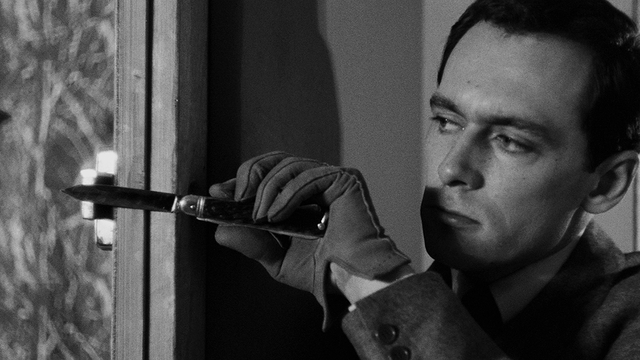
Louis Malle was just 24 when he made Elevator to the Gallows, a film school dropout who had left his studies to work with Cousteau, the oceanographer who was a major celebrity when I was a boy, and who helped Malle's career immensely when he gave the young cameraman a co-directing credit on his documentary The Silent World (1956).
(Cousteau would be famous as the "father of the environmental movement," but while making The Silent World he and his crew dynamited a coral reef to flush out its denizens and massacred a school of sharks that were drawn to the carcass of a baby whale that was killed by the propellor of Cousteau's ship when they tried to film the whale's pod. It was a different time.)
Malle made Elevator to the Gallows at the moment of genesis for the French New Wave: Chabrol's Le Beau Serge would be released the same year as Malle's debut, while Truffaut's The 400 Blows wouldn't come out for another year, and Godard's Breathless wasn't released until 1960. It was a movement searching for an audience, and Malle made the prudent choice to create one by giving French moviegoers something they reliably wanted – a policier.
Even before the first crime is committed we're primed to want Julien and Florence to get away with murder. Her husband is an arms dealer who has profited from France's recent unpopular wars, a man of great influence who hired Julien the war hero as both fixer and bait for his unsavoury clientele. His reaction to Julien when he pulls a gun on him is cool, even contemptuous, at least until he recognizes that the gun in Julien's hand is his.
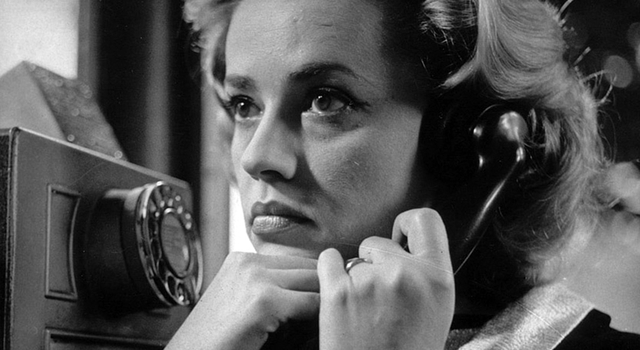
Much as the American filmmakers who made the movies retroactively called film noir by French critics wouldn't have recognized the term or its definition, Hollywood crime dramas and thrillers at the time almost wholly lacked the political dimension that were front-loaded into French films like Malle's.
Controversy lingers around Elevator to the Gallows even to this day thanks to the co-writer of the film's screenplay. Roger Nimier was a novelist and army veteran and leader of the anti-existentialist Hussards, who wrote for monarchist publications and whose reputation as a reactionary still gets Malle's film talked about as having vaguely fascist themes, even today.
Malle made his film during a politically uneasy period in French history, which would basically be the period that began with the Revolution until today. There had been the wars in Vietnam and Algeria and the Piastres affair, all of which would eventually lead to the fall of the Fourth Republic and the return of Charles de Gaulle to power. Suffice to say it only really makes sense if you're French, and in a context where words like "fascist" aren't inevitably meant to be provocative.
The conflicts between characters in the picture are almost entirely generational. There's Carala, whose generation were morally corrupted by their experience with war and occupation, and the subsequent one embodied by Florence and Julien, whose choices and potential have been limited by being in the shadow of men like Carala.
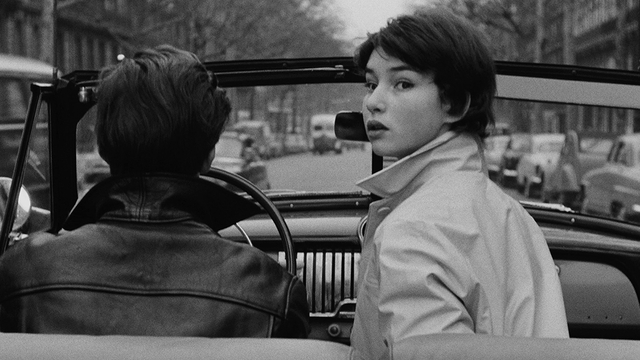
And then there's the youth, whose rebellion is still nascent but nonetheless anticipated with fear by everyone older. They're represented by Veronique (Yori Bertin), the shopgirl at the florists by Julien's office, who has a bit of a crush on the dashing older man, and her boyfriend Louis (Georges Poujouly), a wannabe thug who we first see preening at his reflection in the mirror of the shop, admiring his new leather motorcycle jacket.
When Julien runs back into his office to retrieve the rope, he leaves the keys in his car, a Chevrolet Deluxe convertible, and Louis take the opportunity to steal it for a joyride with an initially protesting Veronique. They drive past Florence waiting anxiously in a café for Julien, who only sees the car and the young girl in the passenger seat and assumes that her lover has not only failed to kill her husband but has blown her off for a shopgirl.
At this point night has fallen and the real business of the film can begin. There's Julien, trapped in the elevator with only his lighter and pen knife. He unscrews one of the panels to discover that he's too far between floors to climb out, then finds the trap door in the floor. He climbs out and tries to swing over and trip the lock keeping the door to the floor below the elevator closed.
It's a thrilling sequence, and the closest thing to a conventional thriller in the picture, made more nail-biting when the night watchman shows up and turns the main power on again, sending the elevator down to the basement with Julien dangling beneath it. It's even more tense thanks to Malle's decision to let it play out without any soundtrack music.
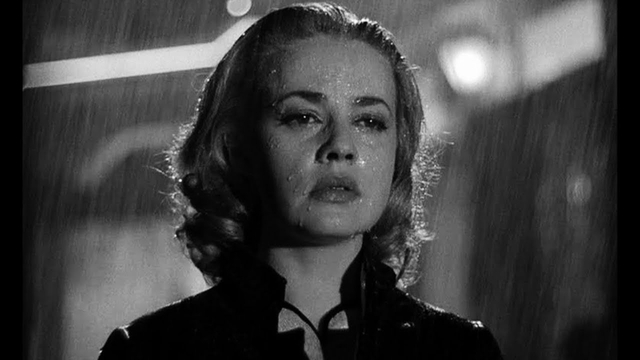
In the meantime Florence is in despair, wandering the streets searching for Julien in their usual haunts, in a long sequence made famous by Miles Davis' groundbreaking jazz score, improvised live in a few takes while the trumpeter was in France between bands, and at a crossroads in his musical career.
Davis had been the youngest of the cohort of musicians spearheading the bebop revolution, and by 1957 he was moving between record labels after firing half of his famous band with John Coltrane and took an opportunity to travel to Paris alone, with the promise of touring with a pickup band worthy of his reputation.
Louis Malle received two gifts while making Elevator to the Gallows. The first was persuading Jeanne Moreau – a minor star of b-pictures but a major one in the theatre – to play Florence in his low-budget picture. (She was appearing as Maggie in Cat on a Hot Tin Roof when Malle visited her backstage to pitch the role, accompanied, at least if you believe Moreau's memory, by one of his producers: Prince Napoleon Murat, a descendant of Napoleon Bonaparte's younger sister, which ties this week's film with the subject of last week's column.)
The other gift was Miles Davis' booking agent in France trying to make up for the cancellation of a series of gigs with the chance to make some money recording a movie soundtrack. Davis, with a band consisting of three Frenchmen (Barney Wilen, Pierre Michelot, and René Urtreger) and expat American drummer Kenny Clarke, recorded the music for the film over two nights at a Paris studio with Moreau playing hostess.
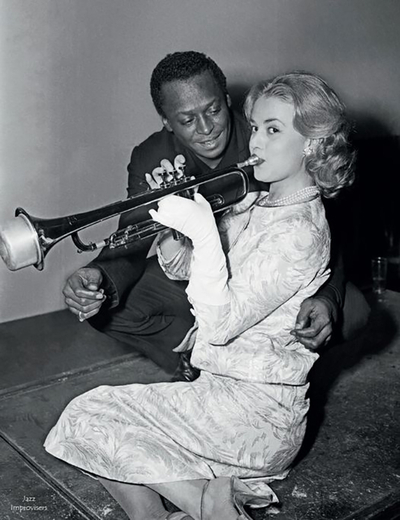
After watching Malle's film a couple of times, he gave the musicians little more than a few chords to work with as they improvised live to screens playing scenes from the picture. The most famous sequence of all is "Florence sur les Champs Élysées", the melancholy, bluesy theme that plays while Moreau's Florence wanders through the darkened streets, lost in a reverie, talking to herself, oblivious to the reactions of passersby, walking through traffic while barely missing the cars speeding past her.
The importance of the film's soundtrack to Miles' career is part of his legend; it was the turning point where he moved away from conventional improvisation to standards to a more abstract, "modal" sound that would lead in just a year or two to Kind of Blue, his most famous album. Its importance is such that I listened to his soundtrack album for decades before I ever saw Malle's film.
Thanks to films like Truffaut's Jules et Jim, we imagine that Moreau was one of the principal muses for the nouvelle vague, but casting her was as much about her minor but relative star power ensuring the film's funding as any creative decision by Malle. She says she quickly agreed to take part when told that there would be no extensive makeup or wardrobe department during production.
There was apparently a revolt at the film lab developing Malle's rushes when scenes like her lonely walk along the Champs Élysées came back, by technicians who were outraged at how unflattering the footage was, filmed with available light on location, with the camera fixed to either a pram or a cart, depending on who tells the story. Until then Moreau's apparent "imperfections" had been hidden under thick makeup, and the men at the lab thought Malle was sabotaging her career with his brutal lighting.
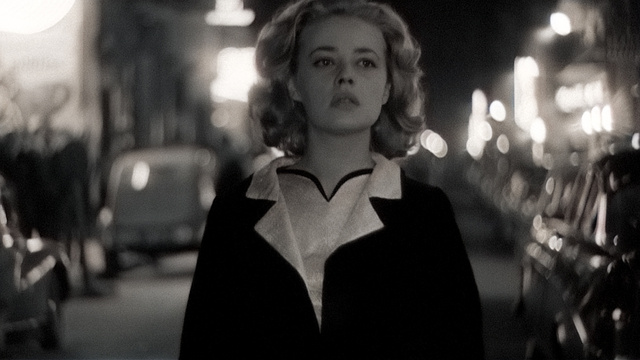
Moreau was no ingenue. With a mouth that relaxed into something between a pout and a sneer and permanent circles under her eyes, she presented herself to the cameras as a woman, not a girl, and her maturity is part of her everlasting appeal. Her closest Hollywood counterparts would be Bette Davis or Barbara Stanwyck, and her "madwoman's walk" through Paris at night is made memorable by her characteristic saunter, and the way her emotions radiate even in long shots.
While Julien dangles and Florence saunters, the young people in Julien's stolen car end up racing the driver of a Mercedes 300SL down the highway all the way to a motel on the outskirts of Paris. Louis' uncertain command of Julien's Chevrolet has him rear-end the Benz, but Horst (Ivan Petrovich), the driver, takes it in stride and invites the young couple to join him and his glamourous blonde wife Frieda (Elga Andersen) for champagne in their motel cabin.
Horst, who had visited France before as part of Hitler's Wehrmacht, is a jolly German who calls himself "the sporting type" and remarks that "we didn't have this brand during the occupation" while pouring out bottles of Bollinger. He's amused by the two young people and sees through Louis' ruse of pretending to be Julien, the worldly ex-soldier. But when the couple try to steal his car he confronts them with a laugh while playfully holding up a cigar tube, pretending it's a gun.
Earlier in the film Veronique had marvelled at Julien's trench coat and car, at the Minox subminiature camera in the pocket and the revolver in the glove box. He has the swagger and experience that Louis longs for but is unwilling to acquire with time and work, preferring to steal it the way he had stolen a scooter the week before. Reaching into the pocket of the coat while Horst confronts him, he pulls out the gun and shoots the older man and his wife dead – a murder that gets pinned on Julien thanks to their childish fib.
In his essay on the film included with the Criterion reissue, critic Terrence Rafferty calls the young couple "brainless kids," and doubtless Malle and Nimier's dismissive take on Louis and Veronique is responsible for no small part of the film's reputation as "reactionary." They abandon the Mercedes – the engine still running, its gullwing doors open – on a bridge as dawn breaks, and retreat to Veronique's tiny maid's flat where she decides that, since they're doomed, they should commit suicide together with an overdose of Gardenal (a brand of phenobarbital used to treat seizures and insomnia). They don't have enough to give them more than a headache when they finally wake up, only to be confronted by an angry Florence looking for an alibi for Julien.
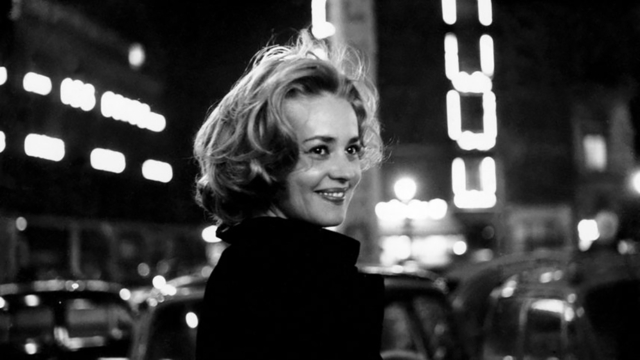
Malle says that he took pains not to make the Paris of his film look like the quaint, antique one in the pictures of older directors. But this was a challenge; the modernist office building where Julien works was the only one he could find in the city, and the gleaming white motel was the only one of its kind in all of France, and not outside Paris but far way in Normandy.
The glass-walled cafes and bars where Florence wanders searching for Julien are conspicuously bright and modern, grafted onto or carved out of older, darker buildings looming over the avenues and boulevards. Even the Germans, with their powerful, stylish new car, are a kind of rebuke to Louis and Veronique, proof of how quickly their defeated enemy has economically rebounded while France has floundered.
"It's Paris as it would be ten years later," Malle said.
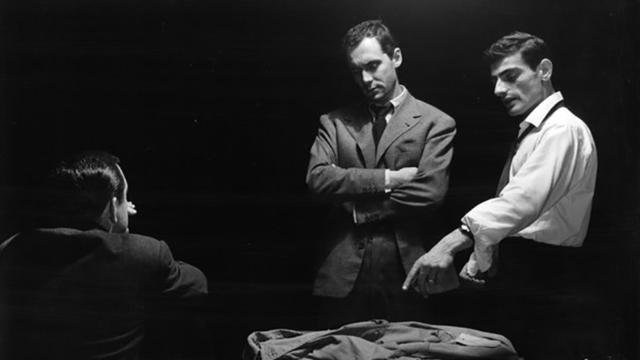
There are plot holes in his film big enough to drive a Citroën through. Like who took the photos of Julien and Florence on the roll of film in the Minox that ends up exonerating Julien of the Germans' murder while implicating the adulterous couple in the killing of Carala? Was it Julien's boozy buddy Christian? Don't trouble your pretty little head about it.
Ultimately it's modernity, with its big cars, freeways, motels, elevators and cameras that are the undoing of every major character in Malle's film, who might not have made the same poor choices in an older, less consumerist, more circumscribed Paris. It's hard not to see why the film has such a reputation for reactionary politics. (You could even say it shares its worldview with that of Jacques Tati, albeit shorn of all his whimsy and humour.)
But it's when we compare Malle's film to its closest noir inspiration that it all starts to feel very French. Both Florence and Veronique are motivated by imagining themselves as heroines in a romantic tragedy; it's hard to imagine Barbara Stanwyck mooning around the streets at night after being stood up by Fred McMurray or Sterling Hayden.
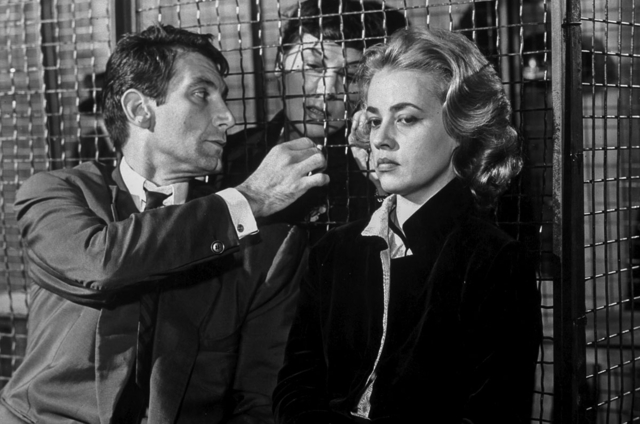
And then there's the reason for Florence being hauled to a police station in a paddy wagon as the sun comes up: being found out at night without an ID card. An American audience would find this confounding. (And I hope they always will.)
But Malle bulldozes through all of this with an indifference that would do Howard Hawks proud, because he knows that his film, if it succeeds at all, will do so on its richly palpable mood and Davis' soundtrack and the closeups he lavishes on Jeanne Moreau. Like the one at the end of the picture when she contemplates her fate – not at the gallows, but with a twenty-year prison sentence, over twice what Julien will get for what a judge will doubtless call a crime of passion.
She gazes at the photos of them together in the darkroom at the motel and imagines her future, the camera staring raptly at her careworn beauty: "No more aging, no more days. I'll go to sleep, I'll wake up alone...I'll be old from now on."
Mark Steyn Club members can let Rick know what they think by logging in and sharing in the comments below, as access to the comments section is one of many benefits that comes along with membership in the Mark Steyn Club.


